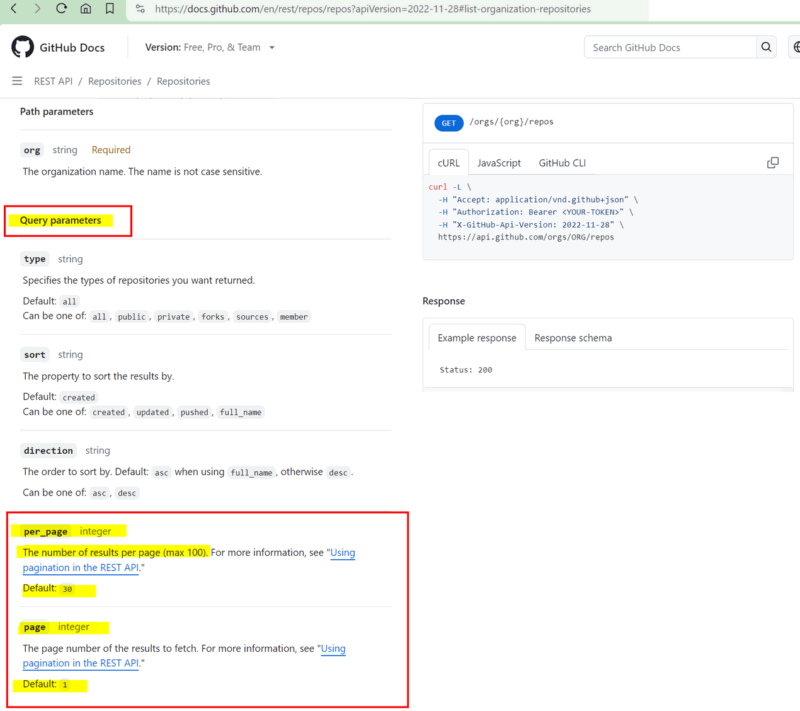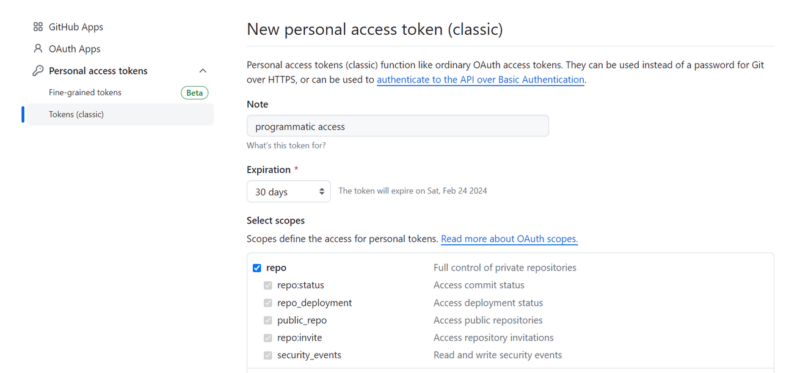Large result-sets returned from calls to GitHub REST API endpoints may undergo truncation.
For example, lets say a call to the list repositories endpoint is run for an organization hosting 200 repos. By default, the output result will contain only 30 repositories .
A closer look at the default values of the following path parameters explains why:
per_page | Number of values per page (default = 30) |
page | The page number of the results to fetch (default = 1) |

This article outlines two approaches for dealing with this behaviour:
- bash script using curl, and a for loop (credits: script was inspired after reading stackoverflow post)
gh cli
Generate Scoped API Token for API Calls
- Login to GitHub with a user account that has admin privileges on the target organization
- Generate a token by navigating to
Settings/Developer SettingsPersonal access tokensTokens (classic)
Generate new tokenGenerate new token (classic)- Enter a
notefor the token, e.g. programmatic access - Ensure
reposcope is ticked

- Store the token in a secure location—e.g. device with drive that is encrypted-at-rest
- For the examples, location
$HOME/tokens/github-api.txtis used
Approach 1: Bash Script and Curl
The sample script $HOME/list-git-repos.sh below lists private repositories (“owned_private_repos“) belonging to a given organization.
#!/bin/bash
target_org=$1
results_file=$HOME/repo-list.txt
api_token_file=$HOME/tokens/github-api.txt
rm ${results_file} 2>/dev/null
private_repos_cnt=$(curl -s \
-H "Accept: application/vnd.github+json" \
-H "Authorization: Bearer $(cat ${api_token_file})" \
-H "X-GitHub-Api-Version: 2022-11-28" \
-L "https://api.github.com/orgs/${target_org}" | jq .owned_private_repos)
limit_per_page=100
pages_required="$(($private_repos_cnt / $limit_per_page + 1))"
for page in $(seq 1 $pages_required); do
curl -s -H "Accept: application/vnd.github+json" \
-H "Authorization: Bearer $(cat ${api_token_file})" \
-H "X-GitHub-Api-Version: 2022-11-28" \
-L "https://api.github.com/orgs/${target_org}/repos?page=${page}&per_page=${limit_per_page}" |
jq .[] |
jq -r '"Repo_id: \(.id), Repo_Name: \(.full_name)"' >>${results_file}
doneIt accepts the GitHub organization name as an input parameter.
Usage Instructions
- Copy the script to target path:
$HOME/list-git-repos.sh - Set to executable
chmod +x $HOME/list-git-repos.sh
- Store the GitHub API token in file:
$HOME/tokens/github-api.txt
Run the script, passing the GitHub organization name as a parameter.
For example, for an organization name foo-org:
$ $HOME/list-git-repos.sh foo-orgOutput results are in file: $HOME/repo-list.txt.
The following head command displays the first twenty records from the output file:
$ head -n 20 $HOME/repo-list.txt
Approach 2: GitHub CLI
Prerequisite: Ensure the GitHub CLI is installed.
- gh api with the
--paginateoption
--paginate
Make additional HTTP requests to fetch all pages of results- Authenticate using API token:
$ gh auth login --with-token <<<"$(cat $HOME/tokens/github-api.txt)"- The following command would return names of all repositories within organization
foo-org
$ gh api /orgs/foo-org/repos --paginate --jq '.[].name'